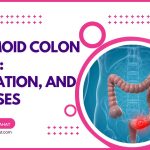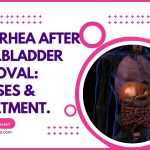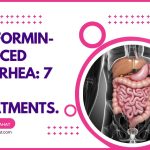Stomach Making Loud Gurgling Noises and Diarrhea: 10 Causes Explained.
Our content is not intended nor recommended as a substitute for medical advice by your doctor. Use for informational purposes only.
The most likely causes of the stomach making lough gurgling noises with diarrhea include:
- Acute gastroenteritis (the most common cause of acute stomach gurgling and diarrhea).
- Irritable bowel syndrome.
- Lactose intolerances and other forms of food intolerance.
- Caffeine and alcohol intolerance.
- Celiac disease.
- Bile acid diarrhea.
- Some medications.
- Gallbladder removal.
1- Acute gastroenteritis: the most common acute of acute stomach gurgling and diarrhea.
Infection is the most common cause of acute diarrhea and stomach gurgling (for a few days or a week).
Acute gastroenteritis is an infection of your stomach or intestine. It is a frequent and common disease, especially in developing countries and children.
The most common causes of gastroenteritis are:
- Viruses include norovirus, rotavirus, and astrovirus (viral gastroenteritis or stomach flu).
- Protozoa such as amoebiasis and giardiasis.
- Bacteria such as E.coli and salmonella.
Symptoms of acute gastroenteritis:
- The symptoms usually start abruptly, it last for 1-4 days.
- Acute onset diarrhea: it can be yellow, greenish, or brown.
- Stomach cramps mainly at the lower abdomen. But it can occur anywhere.
- The stomach makes gurgling loud noises.
- Nausea and vomiting.
- Fever: may be present.
- Loss of appetite (anorexia).
- Muscle aches and headache.
2- Lactose intolerance.
Lactose is the main sugar in milk and dairy products (ice cream, yogurt, and cheese).
Lactose intolerance is a widespread condition. It is also considered the most common type of food intolerance.
Too many people experience intermittent digestive symptoms, and they don’t know it is due to lactose intolerance.
To give you a picture, the prevalence of lactose intolerance in the white race is about 1 in every four people. Also, the prevalence in some other races is shockingly high and may reach up to 90% (blacks, Native Americans, and Asian Americans) (reference).
Symptoms of lactose intolerance:
- The symptoms start a few hours after you eat lactose.
- Abdominal pain.
- Stomach bloating.
- Stomach gas, making loud gurgling noises.
- Diarrhea.
- Nausea and vomiting.
- The severity of symptoms is related to the amount of lactose you ingest.
Doctors suspect lactose intolerance in any adult or child with recurrent abdominal cramps, stomach gurgling, bloating, and diarrhea after eating lactose-containing meals.
The diagnostic tests include:
- A provocative test (oral lactose load).
- Lactose intolerance blood test.
- Hydrogen breath test.
- Taking a biopsy from the small intestine.
Learn more about the diagnosis of lactose intolerance.
3- Irritable bowel syndrome.
Irritable bowel syndrome is a functional bowel disease. It affects 10-15% of people worldwide. (ref)
A functional bowel disease means that the bowels appear normal, but their function is disturbed.
Interestingly, Only 40% of people who match the diagnosis of IBS have a formal diagnosis (reference). This leaves 60% of people NOT knowing that their symptoms are IBS.
According to the ROME IV criteria for IBS diagnosis, IBS is considered when the following symptoms exist:
- Recurrent abdominal pain at least one day per week for the past three months.
- The symptom onset is at least six months.
- The abdominal pain is associated with at least 2 of the following:
- 1- Defecation: abdominal pain either improve or worsens with defecation.
- 2- Change in stool frequency: The onset of abdominal pain is associated with more frequent or less frequent bowel movements.
- 3- change in stool form: the onset of pain is associated with harder or looser stool.
IBS has four subtypes: predominant diarrhea, IBS with predominant constipation, Mixed IBS, and Unspecified IBS.
Stomach-making, gurgling loud noises, and diarrhea can be a symptom of Irritable bowel syndrome with diarrhea.
Consult your doctor if you have prolonged symptoms consistent with IBS.
Learn more about how IBS is diagnosed.
MORE: 5 Causes of Bubbling Sensation in The Lower Abdomen.
4- Other forms of food intolerance and allergy.
Food intolerance doesn’t stop at lactose. Too many foods can cause such conditions.
Food intolerance or allergy can cause loud stomach gurgling noises and diarrhea. You will experience the symptoms every time you eat the offending foods.
Common types of food intolerance and allergy include:
- Lactose intolerance.
- FODMAPs intolerance: a group of short-chain carbohydrates that cause symptoms in people with IBS.
- Fructose intolerance: fructose is the chief sugar in most fruits and honey.
- Gluten intolerance: a protein present in wheat, rye, and barley. Causes celiac disease (see later) and a milder form called “non-celiac gluten sensitivity.”
- Amines intolerance: Produced by bacteria during food storage and fermentation.
- Salicylates intolerance: Salicylates are natural chemicals in various foods, including fruits, vegetables, coffee, and teas.
- Sulfite intolerance.
- Also, some foods can cause more severe allergic reactions, such as Nuts, peanuts, raw meat, seafood, mustard, rice, and some fruits and vegetables.
Below, the difference between food intolerance and allergy is explained:
| Food intolerance | Food allergy |
| Affects 15-20% of the population | Affects nearly 2-5% of adults |
| Difficulty digesting certain types of food (not immune-mediated allergy). | An immune-mediated reaction to certain foods or food components. |
| Causes “recurrent acute” or “chronic” attacks of diarrhea (which can be bright yellow & watery). | Usually causes acute attacks related to the ingestion of offending food. |
| Intestinal symptoms: diarrhea, extensive gas, bloating, and abdominal pain | Intestinal symptoms are the same |
| No extra-intestinal symptoms | Extra-intestinal symptoms like rashes, urticaria, swollen lips or face, or severe life-threatening allergic reactions. |
| The severity of your symptoms is proportional to the amount you eat from the offending food. | Even trace amounts of the offending food can produce severe symptoms. |
Common offending foods:
| Common offending foods: (examples)
|
5- Alcohol and caffeine.
Too many people are also sensitive to both caffeine and alcohol. Diarrhea and stomach gurgling after drinking alcohol or caffeine are also food intolerance reactions.
It is worth mentioning that even small amounts of alcohol can also cause diarrhea and stomach gurgling noise (ref)
Also, caffeine-containing drinks are a common cause of both diarrhea and loud stomach gurgling noises.
Consult your doctor or dietitian if you notice any relation between stomach gurgling, diarrhea, and caffeine/alcohol consumption.
A trial to withdraw caffeine and alcohol is the best way to determine its effects on digestion.
6- Celiac disease.
Celiac disease is an extreme form of food intolerance. Celiac disease is an intolerance to a protein called “gluten.”
Gluten is found mainly in wheat, rye, and barley.
Celiac disease affects about 1% of people worldwide (reference).
Symptoms of celiac disease include:
- Diarrhea is usually chronic and fatty or greasy.
- Bloating, stomach gurgling, and loud noises.
- Nausea.
- Vomiting can also occur.
- Malabsorption of nutrients such as vitamins and iron.
- Fatigue and severe iron deficiency anemia.
- Anorexia (lost appetite) and weight loss.
Some people may experience “atypical celiac disease,” such as intermittent diarrhea and stomach gurgling.
Even more, some people may have asymptomatic forms of the disease (reference).
When celiac disease is suspected, your doctor may need to take a biopsy from the small intestine or perform blood tests to confirm the diagnosis.
A “Gluten-free diet” is the only and the best treatment for people with celiac disease. Cutting gluten from the diet improves all the symptoms of celiac disease.
7- Bile acid diarrhea.
Sometimes, Your intestine cannot deal with bile acids secreted from the liver (the mechanism is unclear).
This leads to malabsorption of the bile acids. A condition that can lead to stomach pain, gurgling, and diarrhea with urgency.
Some scientific reports suggest that about 50% of those diagnosed with IBS have Bile acid diarrhea! (reference 1, reference 2).
We discussed the issue of IBS and Bile acid diarrhea here.
Symptoms of bile acid diarrhea include:
- Diarrhea. The diarrhea is characterized by sudden extreme urgency.
- This “extreme urgency” can end in soiling accidents in some cases.
- Stomach bloating and gurgling.
- The symptoms markedly increase after eating fatty foods.
- The condition also can happen after gallbladder removal.
The diagnosis of BAD is somewhat difficult due to the unavailability of tests and the non-specific symptoms.
8- Medications.
Medications can ruin your digestion. Many medications can produce gastrointestinal symptoms such as diarrhea and stomach gurgling with loud noises.
More than 700 drugs can cause diarrhea. And many others can lead to indigestion symptoms such as stomach gurgling.
Common medications that can cause diarrhea and stomach gurgling noises:
- Anti-diabetes medications: Metformin and Gliptins.
- Antibiotics such as penicillins, cephalosporins, and clindamycin.
- Gastritis and GERD drugs such as Proton Pump Inhibitors (PPIs).
- Laxative abuse.
- Furosemide (Lasix).
- Chemotherapeutic medications.
- Immunosuppressive medications such as mycophenolate and methotrexate.
The complete list of medications that can potentially cause diarrhea (and stomach gurgling) is HERE and HERE.
9- Gallbladder conditions.
Removal of the gallbladder can result in digestive issues for months or years after the surgery. For example, Post-cholecystectomy diarrhea affects about 5-12% of patients after gallbladder removal (reference).
Post-cholecystectomy diarrhea can be a part of complex symptoms after gallbladder removal.
“post-cholecystectomy syndrome” can cause diarrhea, bloating, indigestion, stomach gurgling, and loud noises.
The late type of post-cholecystectomy syndrome can continue to cause symptoms for months or years after the operation (reference).
When to worry/call your doctor?
- The onset of chronic diarrhea after the age of 50.
- the presence of blood in the stool with diarrhea.
- Unexplained weight loss.
- Unexplained fever.
- Severe (watery) diarrhea that is not going away.
MORE:
- Evidence-based
- Written by a doctor.






